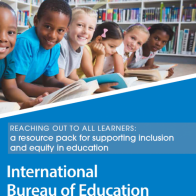The UNESCO International Bureau of Education (UNESCO-IBE) is pleased to publish this new version of the Inclusive Education Resource Pack. Ms. Stefania Giannini, Assistant Director-General for Education of UNESCO, and Mr. Yao Ydo, the UNESCO-IBE Director, wrote the foreword to the new resource pack.
We would like to express our special thanks to Mr. Renato Opertti (Senior Education expert, UNESCO-IBE), Ms. Florence Migeon (Education expert, UNESCO) and Mr. Mel Ainscow (Senior Education consultant) for their contributions to the development of the Inclusive Education Resource Pack. We would also like to extend our appreciation and thanks to the UNESCO-IBE Director, Mr Yao Ydo, for his unconditional support, trust and constructive guidance. A warm thank you also goes to UNESCO-IBE colleagues Ms. Perrine Arsendeau and Mr. Carlos Bueno, who supported the revision and edition of this Resource Pack.
The resource pack Reaching Out to All Learners focuses on a what is arguably the greatest challenge facing education systems around the world, that of finding ways of including and ensuring the learning of all children in schools. In economically poorer countries this is mainly about the millions of children who are not able to attend formal education. Meanwhile, in wealthier countries many young people leave school with no worthwhile qualifications, some choose to drop out since the lessons seem irrelevant, and others are placed in special classes or schools away from mainstream education. UNESCO estimates that girls aged 12-17 are at particular risk of dropping out of school in low- and lower-middle income countries, whereas boys are more at risk in upper-middle and high-income countries.
Recently, teachers have faced further unprecedented challenges as they seek to find ways of ensuring quality education for all their students within the context of the COVID-19 pandemic. Whilst the nature of these challenges varies depending on the location, a common concern is with those students who are known to be vulnerable to marginalization or exclusion, such as those from the poorest households, refugees and those in conflict situations, ethnic and linguistic minorities and indigenous backgrounds, and children with disabilities. It follows that efforts to ensure educational recovery after the pandemic must be based upon the principles of inclusion and equity.
Download the new Inclusive Education Resource :
